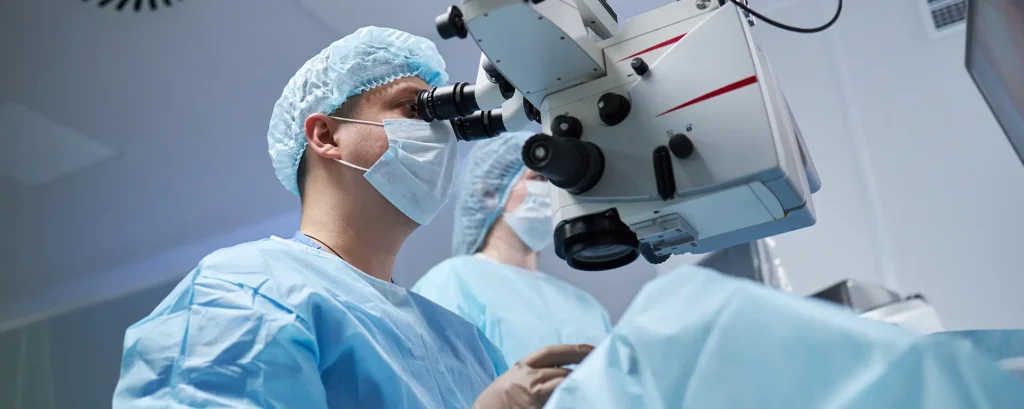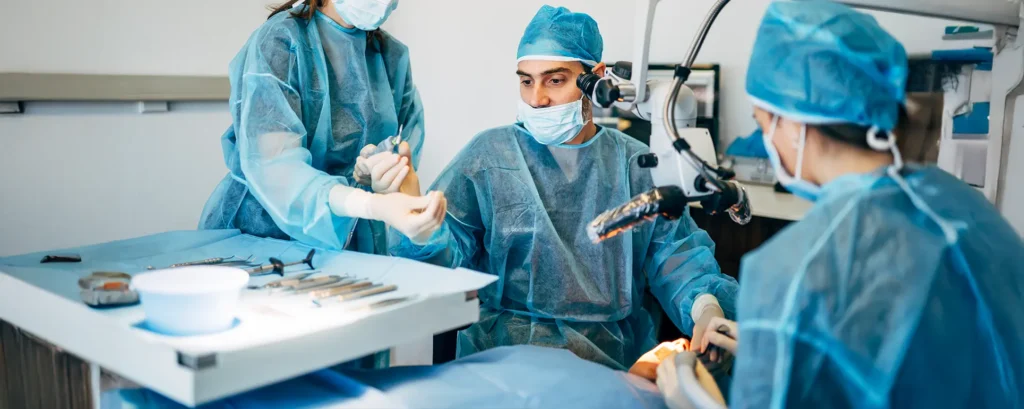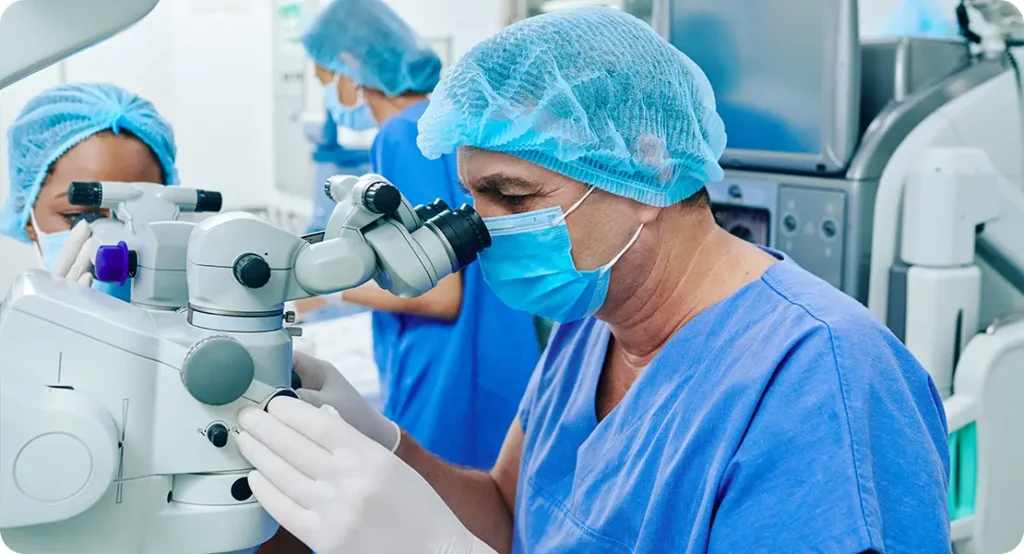If you’re living with bipolar disorder and taking lithium, the idea of having cataract surgery might feel a bit daunting. You may already know that lithium is a highly effective mood stabiliser, but it also requires regular blood monitoring and close attention to fluid and kidney balance. When you add eye surgery into the mix, especially a procedure like cataract surgery, it’s natural to wonder how these two aspects of your health interact. The good news is that with careful planning, most people on lithium go through cataract surgery smoothly.
This article will take you through the key considerations: how lithium interacts with anaesthesia, what your ophthalmologist and anaesthetist will be looking out for, and how your mental health team stays involved throughout the process. By the end, you’ll have a clear idea of what usually happens, what you should discuss with your doctors, and the steps you can take to make sure everything runs safely.
Cataract Surgery in a Nutshell

Cataract surgery is one of the most common and successful procedures worldwide. It’s performed when the natural lens of your eye becomes cloudy, causing blurred vision, glare, or difficulty with everyday tasks. The operation involves removing the cloudy lens and replacing it with an artificial one called an intraocular lens (IOL).
Most cataract surgeries are carried out as day cases, meaning you go home the same day. Anaesthesia is usually local — often in the form of eye drops or a small injection around the eye — so you remain awake but comfortable. Sedation is occasionally used, but full general anaesthesia is rare unless there are specific circumstances.
For most people, the surgery itself is straightforward. But if you’re on lithium, your surgical team needs to take a few extra steps to ensure your safety. That’s because lithium can interact with certain anaesthetic drugs, affect kidney function, and be influenced by dehydration or fluid shifts, all of which can happen during surgery.
Lithium: Why It Needs Extra Attention
Lithium is a powerful mood stabiliser widely used to manage bipolar disorder. While it’s effective, it also comes with a narrow therapeutic window, meaning the difference between a helpful dose and a toxic one is relatively small. This is why people on lithium usually have regular blood tests to monitor levels, kidney function, and thyroid function.
During surgery, things like fluid balance, kidney function, and interactions with medications can all affect lithium levels. For example:
- Anaesthetic agents: Some sedatives or muscle relaxants may interact with lithium, prolonging their effects or increasing the risk of side effects.
- Dehydration: If you’re asked to fast before surgery, or if fluid balance is not carefully managed, lithium levels can rise, leading to toxicity.
- Kidney function: Since lithium is cleared through the kidneys, anything that temporarily reduces kidney efficiency can make levels climb.
This doesn’t mean cataract surgery is unsafe if you’re on lithium. It simply means your healthcare team needs to coordinate closely, checking your lithium levels beforehand, adjusting anaesthetic choices, and ensuring your hydration is maintained.
Pre-Surgery Planning: What to Expect
Before your cataract surgery, you’ll have a pre-assessment appointment. This is where you’ll be asked about your medications, medical history, and mental health conditions. If you’re taking lithium, this will be flagged as an important consideration.
Here’s what usually happens:
- Lithium levels checked: Your team may arrange a recent blood test to make sure your lithium is within the safe therapeutic range.
- Kidney and thyroid function: These tests may also be repeated if not done recently, since both are affected by lithium.
- Communication with your psychiatrist or GP: The surgical team will usually liaise with your mental health team to confirm your current lithium dose and stability.
- Medication instructions: You’ll be told whether to take your lithium on the day of surgery or if a temporary adjustment is needed. This varies case by case and depends on the anaesthetist’s plan.
It’s important you bring a complete list of your medications to this appointment, including lithium and any other psychiatric or general medications you’re on. This helps avoid potential drug interactions and ensures everyone is on the same page.
On the Day of Surgery

When you arrive for your cataract operation, you’ll be checked in and seen by the anaesthetist. This is the person who makes decisions about pain relief, sedation (if used), and monitoring during the procedure.
If you’re on lithium, the anaesthetist will:
- Double-check when you last took your dose.
- Review your recent blood results.
- Ensure fluids are well balanced so you don’t get dehydrated.
- Choose sedative or anaesthetic drugs that are safe with lithium.
In most cases, cataract surgery can be done with minimal sedation or none at all. This makes things much simpler because it reduces the chance of drug interactions. If light sedation is needed to help you feel relaxed, your anaesthetist will carefully select the safest options.
After Surgery: Recovery and Lithium Monitoring
Once your cataract has been removed and the new lens implanted, you’ll be taken to a recovery area for monitoring. If you’ve had sedation, the team will check that you’re alert and comfortable before you go home.
Here’s what usually happens with lithium after surgery:
- Resume normal dosing: Most patients continue lithium as prescribed, unless specifically told otherwise.
- Hydration reminders: You’ll be advised to drink fluids and avoid dehydration, which helps keep lithium levels stable.
- Post-op check-ups: If there are any concerns about kidney function, fluid balance, or unusual symptoms, your doctor may order another lithium level test.
Because cataract surgery is a relatively short and low-risk procedure, most patients on lithium recover without complications. But it’s still vital to watch for any warning signs of lithium toxicity, such as tremors, confusion, excessive thirst, or unsteady walking. If any of these occur, you should seek urgent medical advice.
Coordinating Care Between Teams
One of the most important aspects of having cataract surgery while taking lithium is the coordination between your healthcare providers. This usually involves:
- Your ophthalmologist: Focused on the eye surgery itself.
- Your anaesthetist: Focused on safe drug and fluid management during surgery.
- Your psychiatrist or GP: Focused on keeping your mental health treatment stable.
Together, these teams ensure your care is seamless. Communication between them helps prevent any last-minute surprises, such as uncertainty about whether to pause lithium. It also ensures that if you have any mental health needs during recovery, they are not overlooked.
Practical Tips for Patients on Lithium Having Cataract Surgery

If you’re preparing for cataract surgery while taking lithium, here are some steps you can take to make the process smoother:
- Bring a full medication list — including doses and times.
- Ask for a lithium level check if one hasn’t been done recently.
- Stay well hydrated in the days leading up to surgery, while still following fasting instructions as given.
- Clarify medication instructions with your doctors — don’t stop lithium unless specifically told to.
- Tell your mental health team about your upcoming surgery so they can provide input.
- Watch for warning signs of lithium toxicity after surgery and report any concerns promptly.
By being proactive and open with your healthcare team, you give yourself the best chance of a smooth operation and recovery.
FAQ Section
1. Should I stop taking lithium before cataract surgery?
Not everyone is asked to stop lithium before cataract surgery, and whether you should or not depends entirely on your personal circumstances. Your anaesthetist will weigh up the risks and benefits based on your lithium levels, your kidney function, and the type of anaesthesia being used. In many cases, patients continue lithium as usual, particularly if only local anaesthetic is planned. However, if sedation or general anaesthesia is required, your doctors may suggest missing a dose or adjusting the timing. The key point is that this decision should never be made on your own — always follow the advice of your surgical and psychiatric teams.
2. Can lithium interact with anaesthetic drugs?
Lithium does have the potential to interact with certain anaesthetic drugs, especially muscle relaxants and sedatives, which may prolong their effects. This means you could feel drowsier for longer or need extra time in recovery if the anaesthetist doesn’t plan carefully. Fortunately, cataract surgery often uses minimal or no sedation, which greatly reduces this risk. Anaesthetists are very familiar with lithium and will usually choose alternatives or adjust doses to make sure you stay safe. So while the possibility of interaction exists, it is usually well managed with proper preparation.
3. Will cataract surgery affect my mental health stability?
The operation itself is unlikely to cause changes in mood stability, but any surgical experience can be stressful, especially if you are already managing bipolar disorder. It’s important to remember that sticking to your lithium plan and avoiding sudden changes in medication helps protect your mental health during recovery. In fact, many patients notice a positive boost in their wellbeing once their vision improves, since clearer sight can make daily life easier. If you are worried about the impact on your mood, it’s worth talking to your psychiatrist or GP ahead of surgery so they can support you through the process.
4. How do I know if my lithium levels are safe before surgery?
Your healthcare team will usually request a recent lithium blood test before your cataract surgery to make sure your level is within the therapeutic range. This is a crucial step, because lithium has a narrow safety margin, and even a small increase can cause side effects. If your level is too high, your surgical team may decide to delay the operation until things are corrected. You can make the process smoother by ensuring you attend your routine monitoring appointments and letting your doctors know if you’ve experienced any new symptoms that could suggest a problem with lithium levels.
5. What are the signs of lithium toxicity I should watch for after surgery?
Lithium toxicity can happen if your levels rise too high, and it’s particularly important to be aware of this after surgery, when fluid balance might be affected. Common signs include nausea, vomiting, diarrhoea, unsteady walking, tremors, confusion, slurred speech, and feeling excessively thirsty. If you notice any of these symptoms, you should seek urgent medical help without delay. Even though cataract surgery is a short and low-risk procedure, it’s still best to remain cautious and report any unusual feelings to your doctor, especially in the first few days after your operation.
6. Will fasting before surgery affect my lithium levels?
Fasting before surgery can sometimes cause mild dehydration, which in turn can raise lithium levels. This is why your anaesthetist takes steps to keep your fluids balanced before and during the procedure. You’ll still need to follow fasting instructions carefully, but your team may use intravenous fluids if necessary to prevent dehydration. Most patients on lithium get through fasting without difficulty, but being mindful of the potential impact on your medication helps you understand why hydration is such a key focus of surgical planning.
7. Can I take my other psychiatric medications on the day of surgery?
In most cases, you’ll be advised to continue taking your other psychiatric medications as usual, but this is always checked individually. Some antidepressants or antipsychotics may have interactions with anaesthetic agents, so your surgical team will want to review your full medication list in advance. The safest approach is to bring an up-to-date list of all your prescriptions to your pre-assessment and confirm with the doctors exactly what to take on the day. This ensures there are no surprises and avoids the risks of suddenly stopping important medication.
8. Do I need extra monitoring after cataract surgery because I’m on lithium?
For most people, the standard post-operative monitoring is enough, since cataract surgery is not a major operation. However, your doctor may choose to do an additional lithium level check if there were concerns about fluid balance during the surgery or if you show any warning signs afterwards. The main things you can do to reduce risks are to take your lithium exactly as prescribed, stay well hydrated after the operation, and contact your care team if you notice anything unusual. That way, any problems are caught early.
9. Can cataract surgery be done under general anaesthetic if I’m on lithium?
Yes, cataract surgery can be performed under general anaesthetic if absolutely necessary, but it does require extra planning. General anaesthesia increases the chances of interactions with lithium and puts more stress on kidney and fluid balance. Because of this, most doctors recommend sticking to local anaesthetic wherever possible, as it is safer and equally effective for cataract procedures. If general anaesthetic is unavoidable, your anaesthetist may adjust or temporarily withhold lithium and monitor you more closely. The decision will always be tailored to your personal health needs.
10. Should I tell my psychiatrist about my cataract surgery?
Absolutely — it’s essential to involve your psychiatrist or mental health team if you’re having cataract surgery while taking lithium. They can confirm whether your lithium is stable, provide guidance on dosing, and help you manage any mental health stress around the time of surgery. They may also want to follow up with you after the operation to ensure everything remains balanced. This coordination between your psychiatrist, GP, ophthalmologist, and anaesthetist ensures that both your mental and physical health are properly looked after throughout the process.
Final Thoughts
Having cataract surgery while taking lithium doesn’t need to feel overwhelming, but it does call for some extra planning. We work closely with ophthalmologists, anaesthetists, and mental health providers to make sure everything is managed safely and smoothly. The most important steps are being open about your medications, following the guidance you’re given, and staying alert for any signs that your lithium levels may have shifted.
For most people with bipolar disorder, cataract surgery is safe, straightforward, and can make a big difference to everyday life by restoring clearer vision. With the right preparation, the benefits of surgery can be enjoyed without unnecessary worry. At London Cataract Centre, we carefully plan each procedure around your individual health needs, including the use of medications like lithium, so you can feel confident about your care from start to finish
References
- Harbell, M.W., Varma, S., Ali, M. & Kaye, A.D., 2021. Anesthetic considerations for patients on psychotropic drug therapies. Anesthesiology Clinics, 39(2), pp. 303–319. Available at: https://pmc.ncbi.nlm.nih.gov/articles/PMC8708655/ [Accessed 19 August 2025].
- Kishimoto, N., Arai, T. & Nishihara, F., 2020. Potentiation of rocuronium bromide by lithium carbonate: a case report. Case Reports in Anesthesiology, 2020, Article ID 8887045. Available at: https://pmc.ncbi.nlm.nih.gov/articles/PMC7530805/ [Accessed 19 August 2025].
- Huyse, F.J., Touw, D.J., van Schijndel, R.S., de Lange, J.J. & Slaets, J.P., 2006. Psychotropic drugs and the perioperative period: a proposal for a guideline in elective surgery. Psychosomatics, 47(1), pp. 8–22. Available at: https://pubmed.ncbi.nlm.nih.gov/16384803/ [Accessed 19 August 2025].
- Leone, C.W. & Huggins, C.E., 1984. Anesthetic management of lithium-treated patients. Canadian Anaesthetists’ Society Journal, 31(3), pp. 239–245. Available at: https://pmc.ncbi.nlm.nih.gov/articles/PMC2235801/ [Accessed 19 August 2025].
- Flood, S., 2010. Lithium: mimicry, mania, and muscle relaxants. BJA Education, 10(3), pp. 77–79. Available at: https://academic.oup.com/bjaed/article-pdf/10/3/77/1294129/mkq008.pdf [Accessed 19 August 2025].

